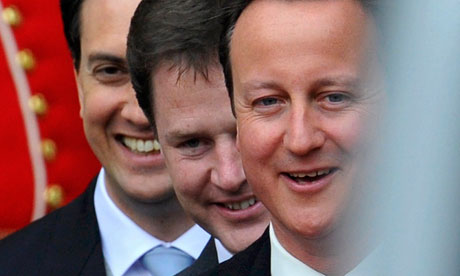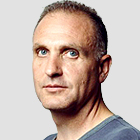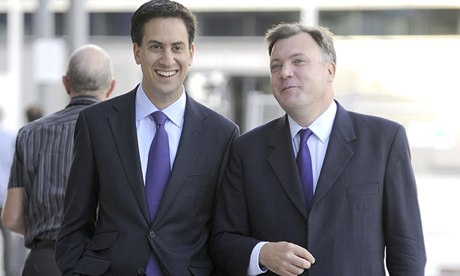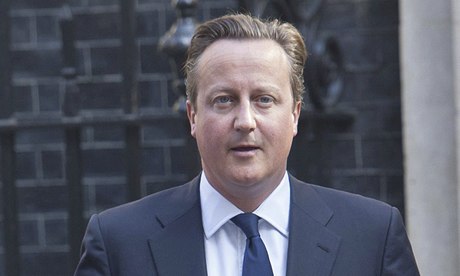Our politicians have lost all credibility. If they want us to engage with them, they had better mend their ways

(L-R) Britain's opposition Labour Party leader Ed Miliband, Deputy Prime Minister Nick Clegg and Prime Minister David Cameron leave after the wedding ceremony of Prince William and Kate Middleton at Westminster Abbey, in central London, April 29, 2011. Photograph: Toby Melville/Reuters
What do the watery eyes of Nick Clegg and the resurfacing of Tony Blair mean? How many more pictures of a man with a pint of beer can anyone bear? Has a whole political class lost the election? What can be done to end their misery? Here are a dozen suggestions as to how politicians might do better ...
1 Forget this talk of reconnection with voters – it sounds stalkerish. Most people have never had a relationship with a political party in the first place. How come politicians carry on as if we were married to them? At what stage in politicians' careers, I often wonder, did they become so surrounded by like-minded people that they didn't notice that we left them long ago?
I learned this salutary lesson when I was working for a small but influential political monthly. Our circulation was smaller than that of Metal Detecting Weekly. Politics as it is practised is regarded by many as a similarly odd hobby. Only without the fun of going round a beach with headphones on.
2 If all political careers end in failure, then perhaps they all start with beliefs? These folk are sucked into a system in which those beliefs are so compromised, they become unintelligible to much of the electorate, who would be hard-pressed to say what their MP actually stands for. Anyone who appears to believe something or "be real" stands out. This is now called "character", as if having a set of extremely rightwing views is actually a sign of amazing individualism under a Tory government. Thus Miliband's current gig – "I feel your racist pain" – is never going to work. Coming from a guy whose parents fled fascism, it is painful. You can't outflank a single-issue politician by accepting their belief system.
3 The so-called "professionalising" of politics is widely despised. No one should become an MP without having done other jobs. The media doesn't count as a job! The small genetic pool of Oxbridge PPE types is bound to produce intellectually inbred and inferior thinkers. This is fine if we want cloned technocrats – but shouldn't we want the democracy that represents us to look like us?.
4 No one should stand for a seat in a place to which they have no connection. Why on earth should ambitious Londoners be helicoptered into safe seats? I have heard talk that the standard of MPs would drop if it were left to local talent alone. Yes, really.
5 Language: the terrible fear of actually saying something results in verbless slogans and expensive logos. Hardworking Britain Better Off, for instance, appears as if it were the result of a brainstorming session that had to be abandoned halfway through as a fire alarm went off. The making up of new phrases should always ring alarm bells. If you can't tell voters who you are and what you want to do with the pre-existing vocabulary and vernacular of the entire English language, surely that's not good.
6 Be honest about what you can and cannot do. Climate change and inequality are global problems. The idea that any economy can survive on its own is clearly nuts, as is the idea that children need to be schooled as if it were the 1950s. No man is an island, not even Nigel Farage. Because nowadays no island is an island.
7 Get with the programme. Alongside loss of reverence for politicians has been a flattening of media hierarchy due to social media. It no longer works to think of us as passive consumers of politics produced from on high. Unless, of course, you are the BBC,which covered the Euro elections as if none of us could use a calculator, thus calling it for Ukip from the very start.
This is a huge turnoff and though we perk up to any signs of actual leadership, whole swathes of debate are happening completely outside the traditional forums.
8 Spit it out. Much feels like a charade if policies are spun. What does a smaller state mean if not privatisation? Why not spell out the need to regulate big business instead of pretending market processes will self-adjust? Why has so little changed with the banking system? Don't underestimate those you seek to represent. We understand the need for regulation and safety nets.
9 Jokes. If they haven't occurred to you, then don't pay a committee to write them into your speeches. Even when professional comedians are involved, there is nothing more offputting than the phrase "topical comedy".
10 Media training. Don't go there. We can spot it a mile off. I blame Bill Clinton and his famous handshake that involved clasping your elbow with his free hand. I have always experienced media-trained politicians as strangely unsuccessful gropers with inappropriate smiles who practise unblinking eye contact.
11 Real life. This means more than two children and a wife who went to Zara and the claim you once liked a CD. Hinterland remains an undervalued asset. We are currently governed by those for whom culture and education is everything to do with getting a better job and nothing to do with having a better life.
12 Don't blame us. The disenchantment of the electorate means that the political class has to change or be changed. It's no use them crying, Sunset Boulevard style: "I am big. It's the politics that got small." The reality is that they have shrunk themselves into a self-regarding circle jerk propped up by a lazy media, just when the problems actually became epic. If they won't be part of the solution, they are part of the problem.



